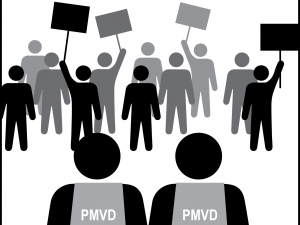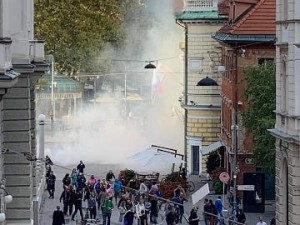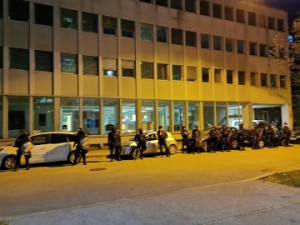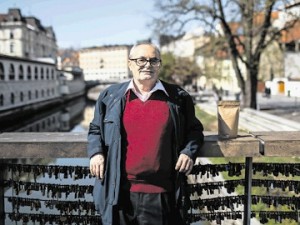Posnetek pogovora Kako pravico do protesta branijo na Poljskem in v Franciji?
24. 2. 2021 | Človekove pravice in manjšine, Mediji, Politika

Kako ubraniti pravico do protesta? Zakaj je to pomembno? Kakšne so izkušnje z uresničevanjem in zagovarjanjem pravice do protesta na Poljskem (pri protestih za pravice žensk in proti prepovedi splava, t. i. »Vsepoljska ženska stavka« oz. »Ogólnopolski strajk kobiet«)? In kakšne v Franciji, kjer se od leta 2016 zoperstavljajo omejitvam protestov in napadom na nevladne organizacije in aktiviste ter so v zagovor pravice do protesta vzpostavili koalicijo Vox Public in povezali več kot ducat organizacij civilne družbe, ki delujejo na področju boja proti diskriminaciji, zagovarjanja socialne pravičnosti ter varstva narave in okolja?
V spletnem pogovoru so sodelovali aktivisti in zagovorniki človekovih pravic iz Poljske in Francije:
- Marta Lempart, voditeljica gibanja Ogólnopolski strajk kobiet
- Draginja Nadaždin, direktorica Amnesty International Poljska
- Jean-Marie Fardeau, VoxPublic
- Laure Paradis, VoxPublic
Pogovor je povezoval Lenart J. Kučić, novinar Pod črto.
Marta Lempart, voditeljica protestniškega gibanja proti prepovedi splava na Poljskem (Ogólnopolski strajk kobiet):
“It would be easier to legalize abortion in Poland than to cause European politicians to start serving people instead of serving each other. I don’t believe it will ever happen and I see that especially being from the so-called new country, Eastern country. If it happens, it’s kind of looking down on us as ‘those Polish persons from this Polish country that need help because – you know – in this Eastern Poland… but things are happening’… The European politicians don’t understand that they have to help me not because I’m some Polish person in some Eastern Poland but because I’m a European citizen and they have duties to me and are there to serve me. They should fight for me, their first obligation is – me. But they don’t see that. They don’t see me as a European citizen, they don’t see me as someone they answer to. Not at all. They see me as some person, as some victim somewhere out there in the cold that needs to be tucked in. I’m not asking for that. I demand that because they forgot what they said. I’m not a victim, I’m paying their taxes, I’m paying their wages. The fact is that European politicians forgot that they are supposed to serve the European people. I don’t think it will ever change. I am sick and tired of those hashtag photos and these speeches and this… I don’t care. I don’t care. Because their contempt toward us as citizens is something that they might not even acknowledge, but it’s there. They think that they are better than us. They think that they can decide how much they can help us and how much they want to help us.”
Draginja Nadaždin, direktorica Amnesty International Poljska:
What is happening right now with women’s protest is a specific thing because we can see that Polish police are using more and more force during the protest. Arrests of the protesters are happening on a regular basis. Sometimes for several hours, sometimes for 24 hours or 48 hours but nevertheless, these people are detained only for expressing their opinion peacefully on the street. The other thing that I think is very obvious is that the police are very often trying to identify the youngest people on the street and target them. For example, participants of the youth climate strikes are targeted but also very young participants of women’s strike are targeted. Police usually think that young people are the weakest ones so they also try to frighten them.




